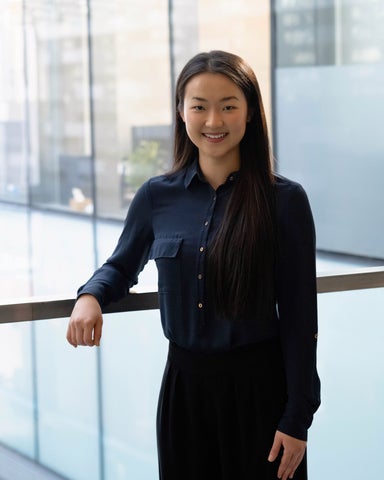
Sarah Meng Li
MMath Student | Combinatorics and Optimization (Quantum Information)
Sarah Meng Li recognizes the value of learning from inspiring mentors and is enthusiastic about sharing her love for quantum with others. Her fondness for collaboration and quantum computing was propelled by the variety of research projects she was involved with while completing her undergraduate degree. At Dalhousie University, Sarah worked on quantum circuit characterization through the lens of number theory and abstract algebra.
Driven by her passion for mathematics and computer science, Sarah participated in the Undergraduate School on Experimental Quantum Information Processing (USEQIP) program at the Institute for Quantum Computing (IQC). After USEQIP, she became a summer intern with IQC faculty member Dr. Michele Mosca which is where she was introduced to architecture-aware circuit synthesis. Sarah is now working to complete her master's degree in quantum information with Mosca, who specializes in quantum-safe cryptography, quantum algorithms and complexity, and methods for mapping quantum circuits to realistic architectures.
Sarah explains that working with Michele has given her the confidence to pursue fundamental research and apply those theories to solve real-life problems. “I’m fortunate to work with quantum computing pioneers who are extremely knowledgeable and never cease to explore different ideas. Being able to navigate projects with their guidance and insights has been very helpful,” says Sarah. “As a grad student, I’m learning so much from working with Michele because he is training me to become a research scientist who is capable of exploring research problems creatively and thoroughly. He encourages me to be open and receptive to new research advancements, to continuously learn new things, and to try out different approaches in my projects.”
One of Sarah’s main research interests is coming up with fault-tolerant solutions for future quantum computers by leveraging the power of quantum compilation. In a quantum system, the information storage unit – the qubit – is incredibly sensitive to interference. Sarah and her collaborators are motivated to propose algorithms and protocols to improve run-times and circuit complexity. An optimized compiling process will be more efficient and more robust to quantum noises.
Sarah appreciates the community at IQC and enjoys sharing ideas with her peers while working to develop the research together. “IQC is a hub for quantum computing in Canada. As someone who is just starting their career, I am very grateful to be part of this community! IQC encourages diversity in research interests and backgrounds. The vibrant and diverse research environment here encourages me to become a well-rounded researcher.”
Sarah has identified gaps in early quantum education, and she is committed to doing her part to encourage more people to learn about quantum science. This realization has attracted her to IQC’s outreach programs, which bring quantum science to the next generation of students. “Whenever there is a call for volunteers, I always try to be there. I volunteer not only for my own curiosity, but because I noticed that there is a profound lack of education and understanding in this field. I know the impact of having a good and passionate mentor and I think it’s important to pass that along to K-12 students.”
Sarah has her eye on the future of quantum computing with plans to complete her master’s degree, obtain a PhD, and become a research scientist in quantum compiling. She looks forward to sharing her knowledge of fault-tolerant quantum compiling and quantum error correction with the scientific community.
To incoming graduate students, Sarah recommends taking the time to learn things that are outside of their comfort zone. “Enjoy the process and see where it takes you. New ideas don’t come from existing ideas – they come from a combination of existing ideas and creative thoughts, generated by things that you have never seen before,” says Sarah. “At IQC, being exposed to new ideas and inspiring researchers leads to collaboration and exciting research avenues.”
Interested in studying Combinatorics and Optimization (Quantum Information) at Waterloo? Learn more about how to apply.